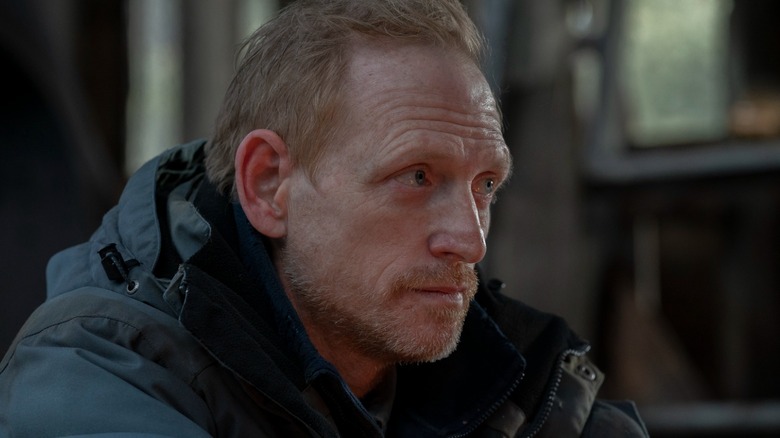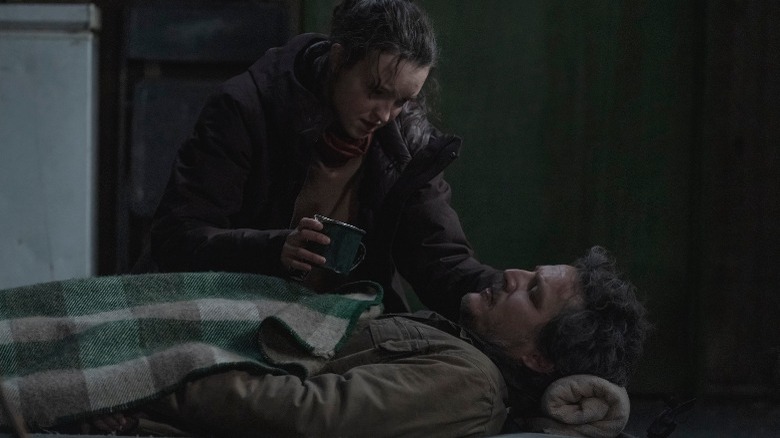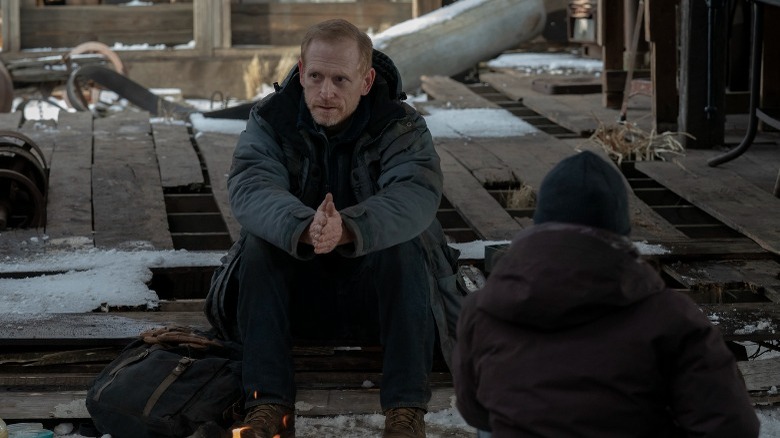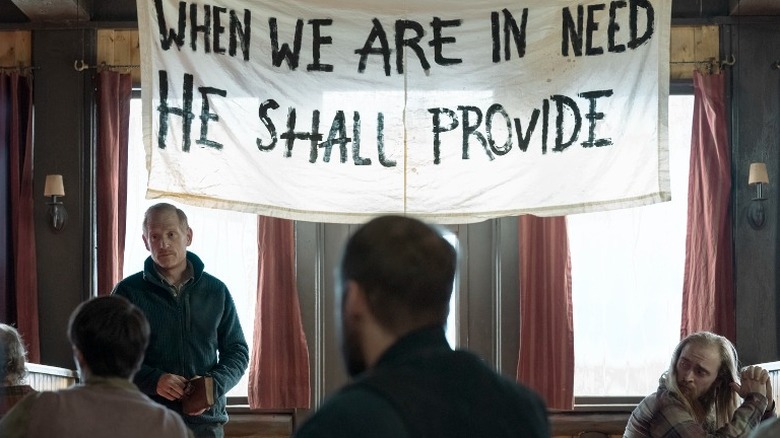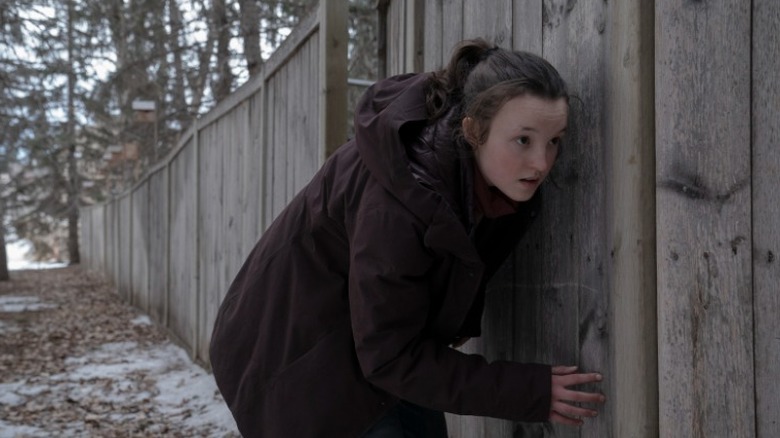The Last Of Us Reminds Us That The Patriarchy Is Hard To Kill
This post contains spoilers for "The Last of Us" episode 8 "When We Are in Need."
Twenty years after its world ends, "The Last Of Us" imagines that humankind's best and worst traits both live on. But in a brutal reality that requires a certain moral ambiguity to survive, it's a lot easier to see the bad than the good.
Sure, there's Joel's (Pedro Pascal) paternal love for his cargo-turned-family Ellie (Bella Ramsey), and Bill (Nick Offerman) and Frank's (Murray Bartlett) enduring companionship in a world free of judgement. But for every act motivated by love, there are others motivated by desperation, fear, hate, or hunger for power. The Kansas City QZ was one example of inhumane, disaster-borne chaos, but this week's episode of "The Last Of Us" introduces another, more organized form of enduring evil: patriarchal violence.
The word "patriarchy" is thrown around so often that it's easy to forget its most specific definition: a system of power organized around the male head of household — a father figure. In this case, that's David (Scott Shepherd), a quietly terrifying man who, in another life, was a math teacher. Now he's a pastor, although he eventually tells Ellie that his god isn't the one he mentions when reading from the book of Revelation: it's Cordyceps, which he describes as the ideal father figure. It multiplies and protects its family, he says, including through violence if necessary.
The episode contrasts two violent father figures
It's the idea of physical harm inflicted in a duty to protect that's at the core of patriarchal violence. We see it in countless revenge movies where dads avenge their murdered daughters, and hear about it in the testimonies of men who confront abusers for hurting their partners. Patriarchal violence in the name of protection is shortsighted and toxic, but it's satisfying on a surface level: you hurt my baby, so I'll hurt you. Interestingly, while it's David who promises to protect his flock, it's Joel who does so through drastic means this week, torturing and killing David's crew to get his "baby girl" back.
It's not lost on me that "The Last Of Us" presents Joel's most unhinged moments alongside a much more overt and disgusting form of patriarchal power-wielding. The series cross-cuts between David's hollow insistence that he's a father to his congregation and Joel's own brutal but effective acts of fatherly love. The two are obviously nothing like one another, but both use fatherhood as an excuse to inflict harm. In this situation, Joel's excuse is convincing enough for now, but David's is paper-thin: he clearly acts not out of love, but some deep craving for dominance and twisted validation.
Teacher, pastor, pedophile
David isn't a tough guy. He manipulates his flock with the language he lords over them, relishing the power he gains through religious control and the dependence required from a congregation that's too hungry to leave him. When he does commit violence, it's against little girls, under the guise of being a wise disciplinarian. When a teen who recently lost her dad speaks up in the middle of David's latest update-slash-sermon, he strikes her hard across the face. Judging by her mother's expression, it's not an unexpected act of violence. "I know you think you don't have a father anymore," he says, barely disguising a sneer, "but the truth is, Hannah, you will always have a father and you will show him respect when he's speaking."
The script of this week's episode, which was written by series co-creator Craig Mazin, subtly gets to the root of what makes patriarchal violence so harrowing and, unfortunately, enduring. It becomes abundantly clear over time that David is a pedophile. He's interested in capturing Ellie to "teach" her and, as he proposes in a condescending and creepy speech just before she breaks his finger, lead his cult alongside her since she's, as he puts it, a "natural leader, smart, loyal, violent." He sees her faith in Joel and perverts it, assuming in his sick mind that she's hungry for a strong male influence. He mistakenly assumes that Ellie is eager to be complimented by a man who uses the oldest grooming tactics in the book to tell her she's not like other girls.
David takes advantage of a power structure that lets him lead
David's own backstory makes a lot more sense once you realize the full extent of his plans for Ellie. "I've always had a violent heart, and I struggled with it for a long time," he tells his captive, "but then the world ended and I was shown the truth." Through a few subtext-heavy lines, we get the sense that David was drawn to groups of people he could control even before the world ended. But he was a relative nobody back then, and in Silver Lake, with mouths to feed, he gets the chance to become somebody. It's an opportunity to don the costume of a male authority figure who's even more esteemed than a teacher: a religious leader.
Patriarchal violence certainly includes that of the uber-violent, misguidedly protective dad, like Joel, but it also has a more structured and insidious underbelly. David's is a methodical, stomach-churning violence that comes via participating in a corruptible, male-dominated institution that lends one man power over many young people. Larry Nassar, Harvey Weinstein, priests in the Catholic church: the list of men who abuse their positions of trust, power, and perceived expertise goes on and on.
Society dies, but bad men persist
Mazin's script seems acutely aware of all of this, and it shows us, even more than "The Last Of Us" video game did, that these often-corrupted power structures might very well live on for as long as people do. People will always search for a place to put their trust, and too often, the place — or man — they choose to follow will lead them down an awful path. Cordyceps has killed many signifiers of society in the twenty years since the outbreak began: travel, healthcare, community, government, and pretty much everything else we take for granted is gone.
Yet patriarchal power structures and corrupt men who take advantage of them live on — until they don't. The show doesn't provide us any answers to the questions this episode raises, but it does bring David's story to a bloody end. He dies not thanks to Joel's intervention, but at Ellie's hand. When she hits him with blow after thudding blow of the weapon he tried to use against her, it's as if she's not just killing one man, but everything he stands for.
If you or anyone you know has been a victim of sexual abuse, help is available. Visit the Rape, Abuse & Incest National Network website or contact RAINN's National Helpline at 1-800-656-HOPE (4673). If you or someone you know is dealing with spiritual abuse, you can call the National Domestic Violence Hotline at 1−800−799−7233.
